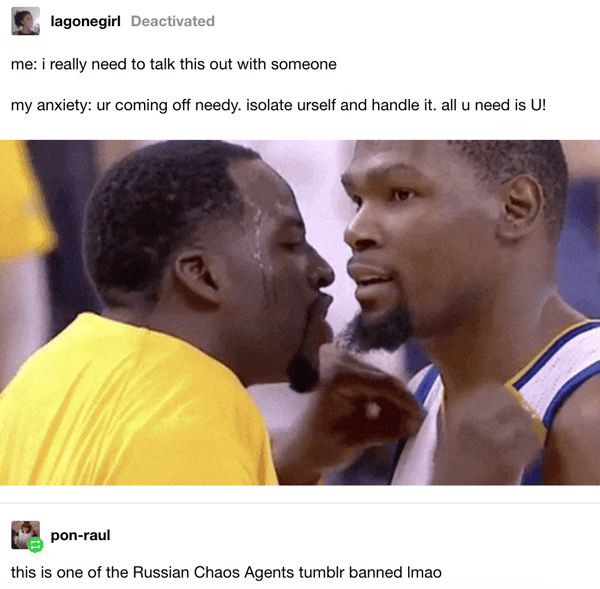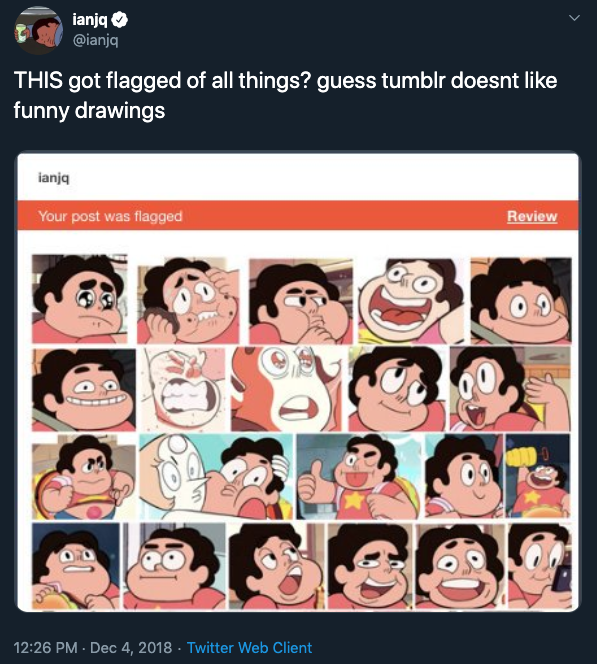It was good to be Tumblr in 2013.
Tumblr was arguably the most popular blogging platform available and a hub for internet culture. Fandoms and communities from every corner were gathering to the site to share fanart and memes, all for free. It was listed among the rest of the social media giants; Tumblr touted Facebook, Twitter, Instagram, and Reddit as peers at this point, and folks outside of fandoms were starting to take notice.
So how did it fall from a valuation of $1.1 billion to $3 million in only six years?
Yahoo and Verizon’s tone-deaf tenure of Tumblr
After being purchased by Yahoo for a staggering $1.1 billion, Tumblr was riding a high of favorable forecasts and positive publicity. Users, on the other hand, were nervous that a new corporate owner would mean ads. In a famous Tumblr post, Yahoo CEO Marissa Mayer promised “not to screw it up,” implying that Tumblr would remain ad-free as it always had.
However, this left Yahoo at an impasse. It didn’t have another plan to make Tumblr profitable, and at the end Yahoo’s first quarter, it reported no revenue from Tumblr. The price of keeping traffic to the site steady was not hosting display ads, but without another plan, Tumblr was potentially $1.1 billion of dead weight.
This didn’t compute for Yahoo. The business appeal for any social media site is ad revenue and user data. Tumblr didn’t provide either since the platform doesn’t require users to share their personal information to have an account; the vast majority of users are anonymous even if they have an online persona.
Unsurprisingly, the “ad-free” promise was broken, and by 2014, native ads were introduced to the site. Native ads are interwoven with other content and appear like normal posts with only a small dollar sign in the corner to denote it as such.
While Tumblr users were less than enthusiastic about the change, by this point, Tumblr’s user base had become numb to unnecessary or unwanted changes to the site, and the addition of advertising was unfortunately expected.
The Russian Chaos Agent fiasco
After Yahoo was acquired by Verizon in 2017, Tumblr, and its problems, came along with it. In March 2018, Tumblr found and deleted 84 accounts attached to Russian propagandists which spread disinformation during the 2016 United States election. Tumblr released the names of the profiles, leading some users to track down posts made by some of them. Some of these posts had nothing to do with American politics so they could blend in better. These accounts were christened “The Russian Chaos Agents” and have remained a meme on the site since.

The Tumblr community recognized the severity of the situation while responding with a healthy dose of Millennial and Gen Z humor. While this wasn’t a great look for Tumblr, it was less severe than the heat other social media platforms like Facebook and Twitter were receiving at the time for similar issues. Tumblr was allowed to escape the incident mostly unscathed.
If anything, it was validating that Russian intelligence included Tumblr at all in their social media propaganda plan.
Tumblr’s removal from the Apple app store
Things were quiet until Nov. 2018 when Tumblr was removed from the Apple app store for hosting images of child sexual abuse. Tumblr’s representatives stated that while they had filters to prevent such material from making it onto the platform, the filters worked by cross-referencing a database of other known abusive material, and since the content posted wasn’t in the database, it made it onto the platform with Tumblr none the wiser.
Verizon put their foot down after this point. The optics of the situation were atrocious at best, and being pulled from the app store meant a significant downturn in traffic and ad revenue, the only thing keeping the app from being completely unviable in their eyes. It was under Verizon’s tenure that Tumblr saw their infamous ban on adult content. On Dec. 3, 2018 Tumblr’s CEO Jeff D’Onofrio said in a post that as of Dec.17, 2018, the platform would flag any and all adult content, citing instances of child abuse specifically as their reasoning for the ban.
Tumblr’s adult content ban
This didn’t go over so well.
While users were elated that images of child abuse would be removed from the site, the majority of them believed Tumblr’s response was ham-fisted and poorly executed.
To start, Tumblr’s algorithm was really bad, and it was flagging images of everything from innocent Steven Universe fanart to pictures of deserts.

D’Onofrio’s original post was also criticized for specifically calling out “female-presenting nipples” as grounds for flagging content. Another post by Tumblr staff clarified that images depicting breastfeeding or gender confirmation surgery would not be flagged, but the damage was already done, and frankly no one believed their algorithm could tell the difference.
Others pointed out that NSFW content isn’t always just porn. Tumblr was and still is a hub for the disenfranchised, such as the LGBTQ+ community. The platform connects queer folk with information concerning safe sex, content that represents them, and other queer people that they might not otherwise have access to. Under the adult content ban, many of these resources would wither, othering a community.
Tumblr has also had a well-documented problem with bot accounts flooding the site with pornographic images and following real users much to their dismay. Users were very vocal about their dislike of these accounts, but it wasn’t necessarily the adult content many had a problem with.
Complaints from users typically cite the fact that these blogs would follow them arbitrarily, not that there was adult content on the site at all. Plenty of NSFW accounts owned by real people existed on the site that didn’t interact with users uninterested in their content, and it was easy enough to avoid pornographic content by simply not following users who posted it or tags related to it.
For users, the one shining upside to Tumblr adult content ban was a solution to the years-old bot problem, albeit a clumsy one. However, many users reported still dealing with porn bots even after the ban, with some reporting it was even worse. With the revelation that the ban didn’t solve the bot menace, even long-time users were fed up.
Dec. 18 marked both a “log off” protest and a mass exodus from the site. Tumblr got their wish and were added back to the Apple app store, but with high cost. As of March 2019, Tumblr has lost 30% of the traffic it had in July 2018. In the month following the ban, Tumblr saw 100 million less visits to the site. Despite this, it has stood by the ban.
The future of Tumblr under WordPress.com
After the adult content ban, it wasn’t difficult to see Verizon was ready toss Tumblr off-board. It was proving to be massive hassle and still didn’t have a plan to make a profit. Verizon started looking for a buyer earlier this year; in May, Pornhub said it would be interested in purchasing the platform, to the mixed dismay and bemusement of users.
After years of being tossed from one confused parent to another, Tumblr may finally land in the hands of an owner that understands the blogging market best. On Aug. 12, WordPress.com owners Automattic bought the platform for $3 million.
While Automattic CEO Matt Mullenweg told the Wall Street Journal that he intends to maintain the ban on pornographic content, there is some hope under these new owners.
Tumblr has been honed by years of tone-deaf leadership attempting to make the site something that it’s not: mainstream. For as popular as the site is, Tumblr isn’t Instagram, Twitter, or Facebook. Users on Tumblr aren’t trying to interact with one another on Tumblr the same way they do on other types of social media.
WordPress.com also hails from the blogging sphere, and Automattic is coming in with a better understanding of Tumblr as a platform that can’t be handled like a standard social media site. Users coming to Tumblr aren’t looking for the standard social media experience, and moves toward that are going to push them away.
Existential dread is a mainstay of Tumblr humor. Its user base has grown skeptical that any of the site’s corporate owners will understand exactly what brings them there. They have stayed through pointless updates and a mobile app that has never quite worked.
But Tumblr is special to a lot of folks, and we’d all like to see it lead by a company that doesn’t see it as another opportunity to sell ad space.


 by Jazmine Betz
by Jazmine Betz
 by Jazmine Betz
by Jazmine Betz
 by Jazmine Betz
by Jazmine Betz